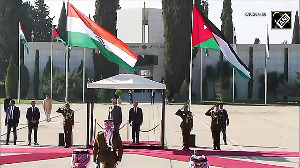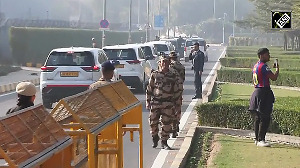After reading carefully what Prime Minister Manmohan Singh and President George Bush said at their joint press conference this morning, is it possible to judge if March 2, 2006, will be remembered as a historic day for Indo-US relationship?
Yes, and No.
Yes, because it's now been finally decided that India will go ahead with its nuclear separation plan. India is ready, it's telling the world today.
It will end the ambiguity over India's standing in the nuclear world and it will help India get fuel supply soon from many countries.
This is big news for India's nuclear science community too.
They have not opposed the separation itself, they have only been worried about the way the deal was negotiated with the US, and they are worried about hidden terms and conditions.
Indian nuclear scientists' culture of research, their life and times will change forever now.
It's big news for India's nuclear strategists and security experts, too. There will be a sea-change in their thinking about India's minimum deterrent doctrine. How many weapons India needs and how many reactors and which technology is needed to maintain its nuclear edge will need absolutely new rethinking.
But as of now, not much can be said if the deal takes care of contentious issues or not because the Joint Statement does not say much about the significant details of the nuclear deal's terms and agreement.
Till those details are not known, it will be too early to celebrate the agreement over nuclear separation.
Under the heading, For energy security and a clean environment, the JS says: 'Both countries welcomed the successful completion of discussions on India's separation plan and looked forward to the full implementation of the commitments in the July 18, 2005, Joint Statement on nuclear cooperation. This historic accomplishment will permit our countries to move forward towards our common objective of full civil nuclear energy cooperation between India and the United States and between India and the international community as a whole'.
This means that till Bush flies to Pakistan not much will be known officially about the nuts and bolts of the nuclear agreement. Prime Minister Manmohan Singh will announce it in Parliament but it's not known when he will do it.
Expectedly, Indo-US relationship did not get a dramatic push because President Bush steadfastly refused to say even a line acknowledging India's eligibility or qualification for membership of the UN Security Council.
Although it was known that Bush will not change his stand on the UNSC issue, his forthright remarks in New Delhi did come as a reality check. However, Bush was more forthcoming on serious issues than Prime Minister Singh.
Most observers feel the JS is silent on specifics -- which means there are issues to be resolved yet -- and although the chemistry between the two leaders looks great, both countries have many miles to cross before India trusts the US as her strategic partner.





